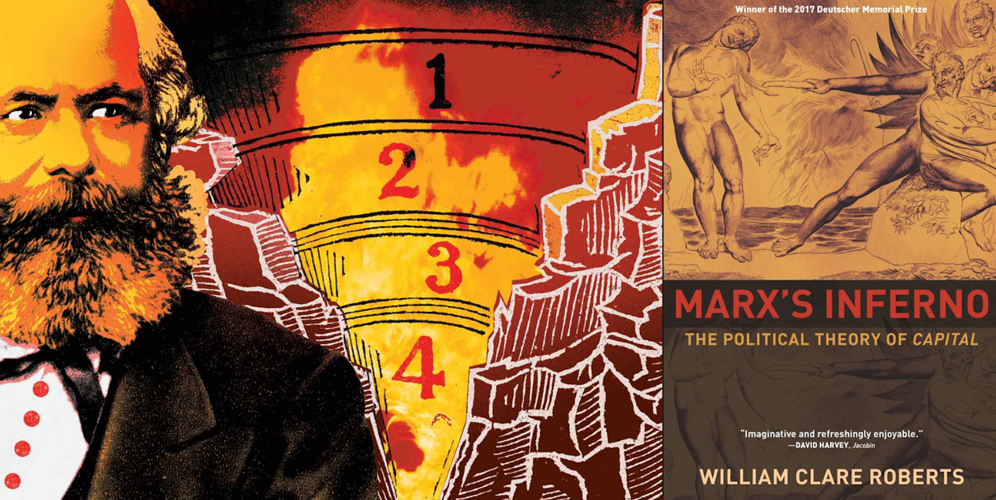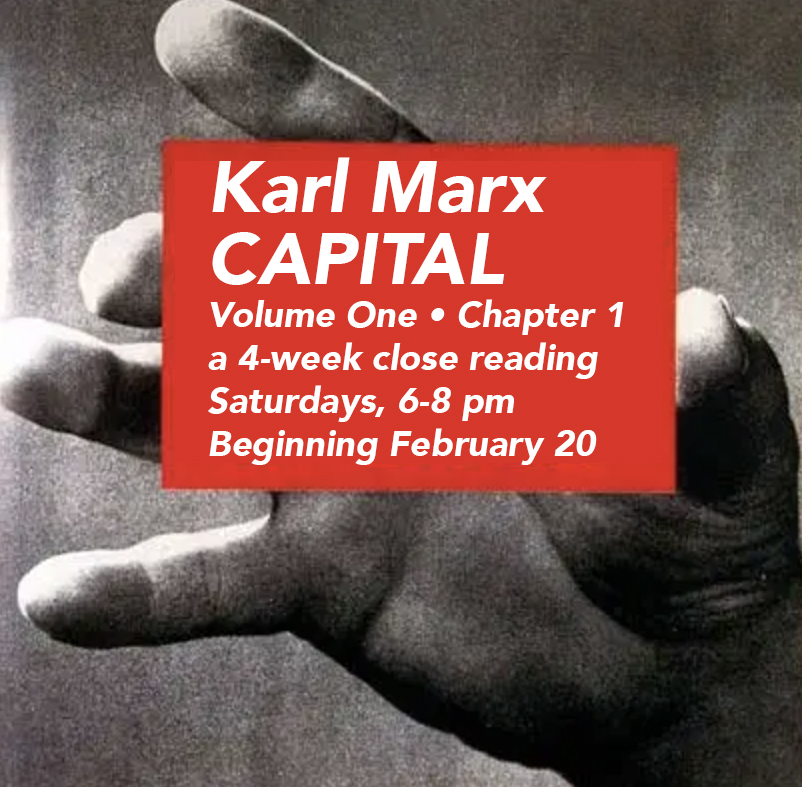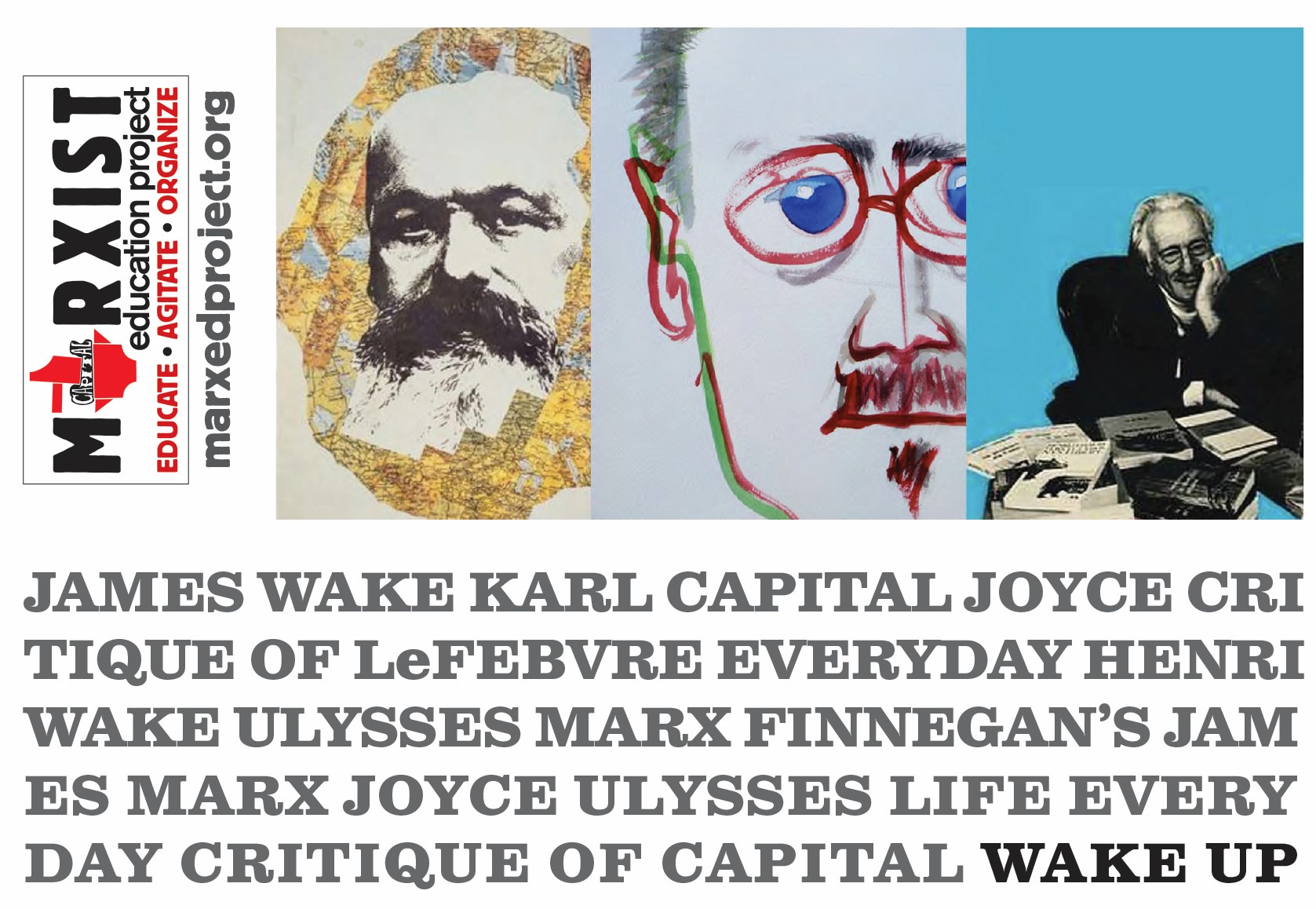Capital
Descent Into the Inferno: The Politics of Marx’s Capital
Online: Zoom link will be provided to registered participantsMarx’s Inferno, by William Clare Roberts, reconstructs the major arguments of volume I of Karl Marx’s Capital and inaugurates a completely new reading. His argument is that Capital was primarily a careful engagement with the motives and aims of the workers’ movement of the mid-19th century. Understood in this light, Capital emerges as a profound work of political theory. For Roberts, Capital was ingeniously modeled on Dante’s Inferno, with Marx in the role of the proletariat's Virgil guiding us down to the secret depths of capitalism’s “social Hell.”
Descent Into the Inferno: The Politics of Marx’s Capital
Online: Zoom link will be provided to registered participantsMarx’s Inferno, by William Clare Roberts, reconstructs the major arguments of volume I of Karl Marx’s Capital and inaugurates a completely new reading. His argument is that Capital was primarily a careful engagement with the motives and aims of the workers’ movement of the mid-19th century. Understood in this light, Capital emerges as a profound work of political theory. For Roberts, Capital was ingeniously modeled on Dante’s Inferno, with Marx in the role of the proletariat's Virgil guiding us down to the secret depths of capitalism’s “social Hell.”
Descent Into the Inferno: The Politics of Marx’s Capital
Online: Zoom link will be provided to registered participantsMarx’s Inferno, by William Clare Roberts, reconstructs the major arguments of volume I of Karl Marx’s Capital and inaugurates a completely new reading. His argument is that Capital was primarily a careful engagement with the motives and aims of the workers’ movement of the mid-19th century. Understood in this light, Capital emerges as a profound work of political theory. For Roberts, Capital was ingeniously modeled on Dante’s Inferno, with Marx in the role of the proletariat's Virgil guiding us down to the secret depths of capitalism’s “social Hell.”
Descent Into the Inferno: The Politics of Marx’s Capital
Online: Zoom link will be provided to registered participantsMarx’s Inferno, by William Clare Roberts, reconstructs the major arguments of volume I of Karl Marx’s Capital and inaugurates a completely new reading. His argument is that Capital was primarily a careful engagement with the motives and aims of the workers’ movement of the mid-19th century. Understood in this light, Capital emerges as a profound work of political theory. For Roberts, Capital was ingeniously modeled on Dante’s Inferno, with Marx in the role of the proletariat's Virgil guiding us down to the secret depths of capitalism’s “social Hell.”
Descent Into the Inferno: The Politics of Marx’s Capital
Online: Zoom link will be provided to registered participantsMarx’s Inferno, by William Clare Roberts, reconstructs the major arguments of volume I of Karl Marx’s Capital and inaugurates a completely new reading. His argument is that Capital was primarily a careful engagement with the motives and aims of the workers’ movement of the mid-19th century. Understood in this light, Capital emerges as a profound work of political theory. For Roberts, Capital was ingeniously modeled on Dante’s Inferno, with Marx in the role of the proletariat's Virgil guiding us down to the secret depths of capitalism’s “social Hell.”
Descent Into the Inferno: The Politics of Marx’s Capital
Online: Zoom link will be provided to registered participantsMarx’s Inferno, by William Clare Roberts, reconstructs the major arguments of volume I of Karl Marx’s Capital and inaugurates a completely new reading. His argument is that Capital was primarily a careful engagement with the motives and aims of the workers’ movement of the mid-19th century. Understood in this light, Capital emerges as a profound work of political theory. For Roberts, Capital was ingeniously modeled on Dante’s Inferno, with Marx in the role of the proletariat's Virgil guiding us down to the secret depths of capitalism’s “social Hell.”
Descent Into the Inferno: The Politics of Marx’s Capital
Online: Zoom link will be provided to registered participantsMarx’s Inferno, by William Clare Roberts, reconstructs the major arguments of volume I of Karl Marx’s Capital and inaugurates a completely new reading. His argument is that Capital was primarily a careful engagement with the motives and aims of the workers’ movement of the mid-19th century. Understood in this light, Capital emerges as a profound work of political theory. For Roberts, Capital was ingeniously modeled on Dante’s Inferno, with Marx in the role of the proletariat's Virgil guiding us down to the secret depths of capitalism’s “social Hell.”
Descent Into the Inferno: The Politics of Marx’s Capital
Online: Zoom link will be provided to registered participantsMarx’s Inferno, by William Clare Roberts, reconstructs the major arguments of volume I of Karl Marx’s Capital and inaugurates a completely new reading. His argument is that Capital was primarily a careful engagement with the motives and aims of the workers’ movement of the mid-19th century. Understood in this light, Capital emerges as a profound work of political theory. For Roberts, Capital was ingeniously modeled on Dante’s Inferno, with Marx in the role of the proletariat's Virgil guiding us down to the secret depths of capitalism’s “social Hell.”
Capital, Volume 1, Chapter 1, Special 4 week
Online: Zoom link will be provided to registered participantsStarting this Saturday there will be a new four-week session on Saturday evenings from 6 to 8 pm covering Chapter One of Volume One of Karl Marx's Capital. All are welcome to attend. Register here on The MEP site.
Capital, Volume 1, Chapter 1, Special 4 week
Online: Zoom link will be provided to registered participantsStarting this Saturday there will be a new four-week session on Saturday evenings from 6 to 8 pm covering Chapter One of Volume One of Karl Marx's Capital. All are welcome to attend. Register here on The MEP site.
A New Digital Taylorism? with Matt Cole, Hugo Radice, Charles Umney
Online: Zoom link will be provided to registered participantsIn his analysis of the workplace, Marx concludes that “Large-scale industry possesses in the machine system an entirely objective organization of production, which confronts the worker as a pre-existing material condition of production:”, and defines this condition as the real subsumption of labor. A hundred years later, his analysis informed modern socialist studies of labor and the struggle for workplace.
Capital, Volume 1, Chapter 1, Special 4 week
Online: Zoom link will be provided to registered participantsStarting this Saturday there will be a new four-week session on Saturday evenings from 6 to 8 pm covering Chapter One of Volume One of Karl Marx's Capital. All are welcome to attend. Register here on The MEP site.
Joyce, Marx, Lefebvre: Considerations for the 21st Century
Recording available on YouTubeA video of this August 20, 2022, event is available on the MEP's YouTube channel. Two days after Bloomsday 2022, Andy Merrifield joined us to consider how Karl Marx and Henri Lefebvre help shed new light on James Joyce - and vice versa. Capital circulated through Marx the same way the Liffey circulated through Joyce's Finnegan's Wake: ... Read more
The Working Class and the Middle Classes: Allies or Foes? with John Milios
Recording available on YouTubeA lecture by JOHN MILIOS, Professor of Political Economy at the National Technical University of Athens. The classical political economists defined three social classes on the basis of their forms of income: capitalists (profits), workers (wages), and landowners (rents). Marx, in his critique of political economy, developed a new, non-economistic and non-mechanistic "relational" class theory. On the basis of Marx's approach, we can tackle complex problems concerning the class structure of contemporary societies and the gray area between the working and middle classes.
From Austerity to Fascism: The Capital Order
Recording available on YouTubeIn The Capital Order, Clara E. Mattei explores the intellectual origins of austerity to uncover its originating motives: the protection of capital-and indeed capitalism - in times of social upheaval from below. Drawing on newly uncovered archival material from Britain and Italy, she offers a damning account of the rise of austerity - and of modern economics - at the levers of contemporary political power. Mattei reveals how the threat of working-class power in the years after World War I animated top-down economic policies that elevated owners, smothered workers, and imposed a rigid economic hierarchy across societies.





